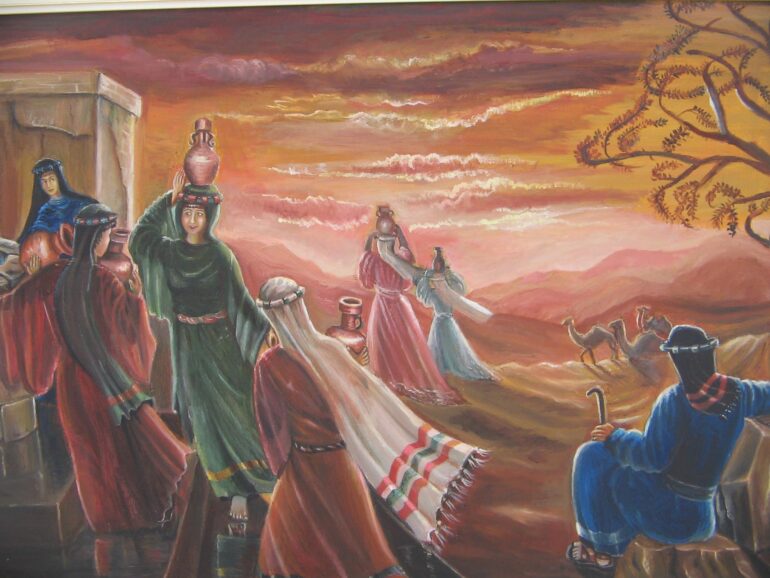The mission of building the Hebrew nation passes to the next generation in Parshat Ḥayei Sarah as Avraham sends Eliezer to the city of Naḥor in order that he find a suitable wife for Yitzḥak.
Upon arriving in the city, the servant seeks assistance from HaShem in recognizing the proper partner for his master’s son. He is then immediately introduced to Rivka, who meets every criterion and even reveals herself to be a relative of Avraham. Eliezer immediately understands this to be a match made in heaven.
“Every day a bat kol proclaims ‘Miss X to Y’” (Moed Katan 18b)
Our Sages further teach that “woman and man are joined by G-D.”
The success of Eliezer’s mission clearly illustrates this theme. When he relates the story of his journey to Rivka’s family, they respond by proclaiming their understanding that HaShem had orchestrated events for Eliezer in order that he find Yitzḥak’s appropriate bride.
“Then Lavan and B’tuel answered and said, ‘The matter stemmed from HaShem! We can say to you neither bad nor good. Here, Rivka is before you; take her and let her be a wife for your master’s son as HaShem has spoken.’” (B’reishit 24:50-51)
This is the clearest confirmation of Eliezer’s success as Avraham’s student. In addition to accomplishing his mission of finding Yitzḥak a worthy bride, he brings Lavan and B’tuel to an awareness of HaShem as the active Force guiding human events. Through the way in which he tells his story, Eliezer reveals the Kadosh Barukh Hu as having been directing him all along, making it obvious that the Holy One arranges the circumstances through which people meet.
Our sages teach that “No one finds his mate without Divine intervention” (B’reishit Rabbah 68). And once they meet, something inside them is gradually awakened and they come to realize the inherent compatibility between them. The Torah illustrates this when Yitzḥak and Rivka first encounter one another.
“And Rivka raised her eyes and saw Yitzḥak; she inclined while upon the camel. And she said to the servant, ‘Who is that man walking in the field towards us?’ And the servant said, ‘He is my master.’ She then took the veil and covered herself. The servant told Yitzḥak all the things he had done. And Yitzḥak brought her into the tent of Sarah his mother; he married Rivka, she became his wife, and he loved her; and thus was Yitzḥak consoled after his mother.” (B’reishit 24:64-67)
Yitzḥak and Rivka were new to one another and appear in the text to have been entirely passive in the process of coming together. Their families and a servant had made all of the arrangements. More accurately, HaShem had put the match together. Yitzḥak brought Rivka into Sarah’s tent and they were married. The Torah shows Yitzḥak’s deep affection for Rivka in one delicate phrase: “She became his wife, and he loved her.”
The Torah teaches here that one of the truest revelations of wisdom and strength is love after marriage. While the “love” that often exists beforehand can be easy, enjoyable and free from responsibility, the true test for a couple is to forge and strengthen a deep spiritual bond of love after the wedding.
“Whenever love is dependent upon a specific consideration – when that consideration vanishes, the love ceases. If, by contrast, it is not dependent upon a specific consideration – it will never cease.” (Pirke Avot 5:15)
The Rambam comments on this teaching that a “specific consideration” means a matter of no significance – an external factor that is trivial in nature.
At no point is Yitzḥak influenced by external factors. Nor does the Torah reveal even a hint of dwindling in the love between him and Rivka – even under the most difficult conditions.
Like Sarah and Raḥel, Rivka was barren and the couple had to wait twenty years to become parents. While even Yaakov and Raḥel would later clash over this very issue (B’reishit 30:1-2), there is no evidence of this ever occurring between Yitzḥak and Rivka. Their deep bond could not be impaired by external factors, even in matters of considerable importance. This strength of character – which forged the basis of their connection – was eternal (B’reishit 26:8 even shows them laughing together in Grar).
Even in old age, when Rivka intervenes for Yaakov to receive her husband’s blessing over Esav, Yitzḥak does not appear angry. In fact, the event itself reveals a small glimpse of Rivka’s greatness as a wife. When it came to the issue of which son should be selected to inherit and continue the Hebrew mission, she knew better than Yitzḥak. Yet not once did she treat her husband with disrespect. As a loyal and devoted wife, she was vigilant to safeguard his honor – even if it required resorting to duplicity.
He loved her. She honored him. They enjoyed each other’s company. It appears that Yitzḥak and Rivka, the Torah’s ideal model of a monogamous marriage, were conscious and highly considerate of one another’s needs. She understood that a man’s inner nature is to be compassionate and giving but that most can only express the appropriate love and affection when their egos are secure – when fully confident in their role as leader of the family.
While men of Yitzḥak’s greatness are often able to love their partners without the stifling insecurities that plague lesser men, Rivka appears not to take her husband’s strengths for granted and is actually vigilant to safeguard his honor.
And while Rivka – a prophetess with the uncanny strength to overcome a mother’s nature and recognize the evil in her son Esav – may not require the attention or emotional investment from her husband that some women need, Yitzḥak seems to give it to her anyway. Unlike Avraham and Yaakov, Yitzḥak limits himself to only one wife. Rivka has no competition for her husband’s affections. He spends time with her. They laugh together. Despite his stature and revolutionary mission, he appears to invest real effort into his marriage.
Both Yitzḥak and Rivka gave their partner more than actually required. Neither took the other for granted. In this couple, we are shown the secret to an ideal relationship. When a marriage is uplifted to the level of Divine service, no external factor should be able to endanger it.
Studying the lives and deeds of Israel’s patriarchs and matriarchs is actually learning about our own collective identity as their descendants. While there’s obviously much to learn from Avraham, Sarah, Yaakov, Leah and Raḥel, Yitzḥak and Rivka seem to offer the best model for our generation when it comes to building strong family units able to fully contribute to advancing the Hebrew mission.





